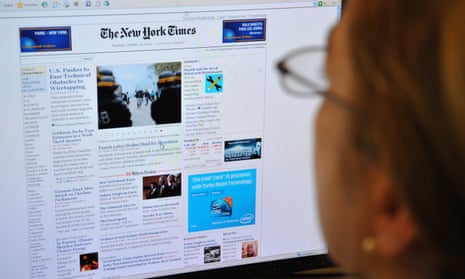Online newspapers and magazines have come to depend, for their income, on a system of advertising and surveillance, which is both annoying and unjust.
Readers are rebelling by installing ad blockers, which cut into the publisher’s surveillance-based income. And in response, some sites are cutting off access to readers unless they accept being surveilled. What they ought to do instead is give us a truly anonymous way to pay.
Some people use ad blockers because they find the sight of an advertisement offensive. That’s purely subjective, and publishers could argue that readers are overreacting. Yet ads on the internet do inconvenience readers too. Adverts increase the amount of data needed to view a page, making it slow to load and expensive on a mobile connection.
At a deeper level, tailored ads also imply snooping, because the most lucrative, targeted advertising on the internet nowadays is based on tracking people’s interests and behaviour.
Tracking, as we know, gives companies and governments dangerous power; the intimidating effect of general surveillance has been measured and is massive. The rate of visits to some Wikipedia pages – those about “al-Qaida”, “car bomb” and “Taliban” – declined by one-fifth after Edward Snowden showed us how much the US government spies on our internet activity. The thousands of users who were presumably intimidated into not looking up these subjects were not terrorists, but citizens who feared that governments would treat them as terrorists.
I’ve never been particularly bothered by ads online, but began using anti-surveillance technology because I object to mass surveillance. I understand how surveillance threatens individuals and democracy. As a side effect, this technology blocks ads that track users.
Use of ad blockers used to be rare, but increased dramatically in 2015. Sites began losing significant tracking-based revenue as substantial fractions of visitors declined to be tracked. Magazines such as Forbes and Wired began denying access to visitors running ad blockers. It seemed they were saying that if readers don’t like ads, and don’t want to let ad networks track them, then readers should subscribe to the publisher and let them track their personal interests instead. Yet this “solution” is another form of the problem – no thank you!
Publishers have been highly critical of ad blockers, which present yet another threat to their diminishing advertising revenues. One company, Adblock+, invites publishers to pay so that their ads won’t be blocked. Publishers consider this a kind of extortion. With a free (libre) ad blocker, users can control what is blocked.
But there is way for publishers to charge readers without monitoring their behaviour: publishers that charge for access should offer the option to pay a small amount anonymously to get an individual story. The system should be unlinkably anonymous, meaning that if you pay for one story today and another story tomorrow, the publisher’s site can’t tell that those two transactions were both done by the same person. Alternatively, sites could invite the reader to donate the amount they wish each time they read a story. There are many possible variants.
For the system to be ethical, it should avoid other unjust practices. Readers should be able, for example, to pay and download the story while running solely free (libre) software. In addition, stories should not by afflicted with what the free software movement and digital rights campaigners call “digital restrictions management” (and what its proponents call “digital rights management”). And the reader should not be required to accept any form of contract (end-user license agreement) about what she is or isn’t allowed to do with the articles she downloads. That should be governed by copyright alone.
For the GNU operating system, which was created by the free software movement and is typically used with the kernel Linux, we are developing a suitable payment system called GNU Taler that will allow publishers to accept anonymous payments from readers for individual articles. We hope that publishers will adopt GNU Taler or something equivalent, so they can profit from defending privacy rather than from exposing their readers.
Publishers, please let me pay you – anonymously!
